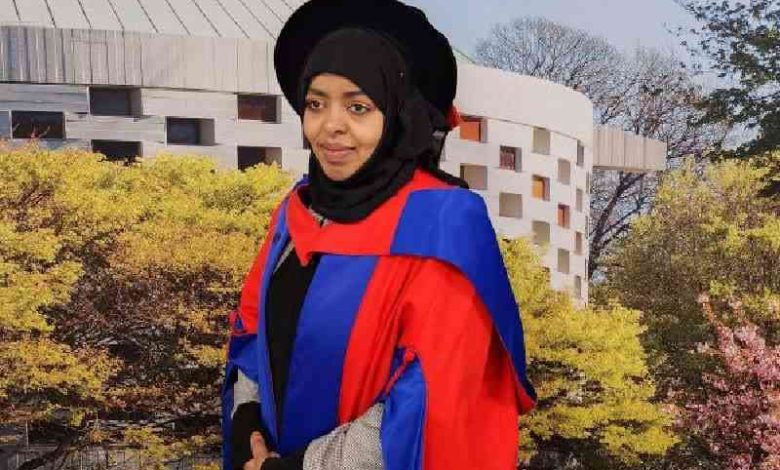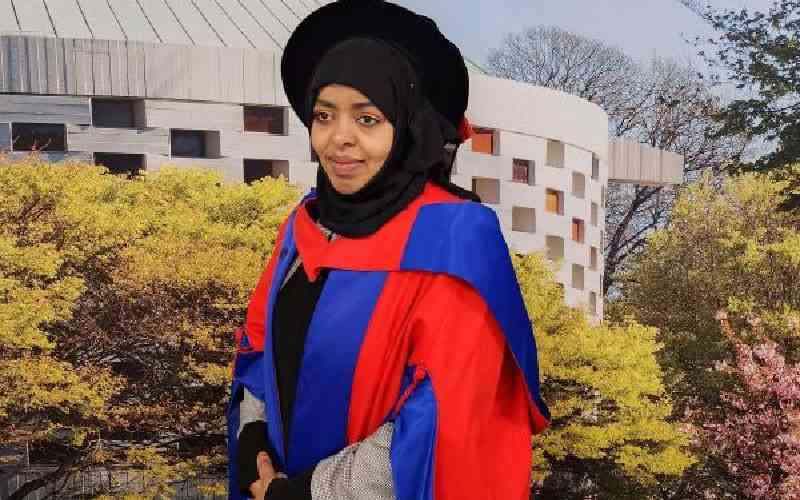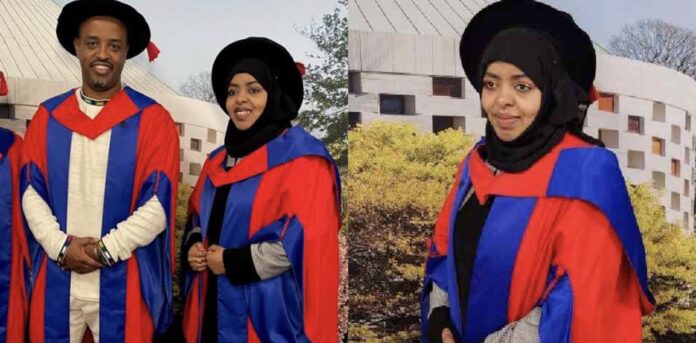Meet Tahira Mohamed, the youngest PhD holder in Kenya, who scored 253 KCPE marks

Tahira Mohamed scored 252 marks in the Kenya Certificate of Primary Education (KCPE).
However, despite the poor performance, she has, over the years, risen to become one of the youngest PhD holders in the country.
Mohamed holds a PhD degree in Development Studies from the the University of Sussex, Brighton.

Tahira scored 252 marks in the Kenya Certificate of Primary Education exam.
She’s the fifth child in a family of two boys and seven girls. The family hails from Moyale, Marsabit County.
Due to her father’s mental illness, her mother was the only one who could make ends meet.
She had to work alongside her mother to provide for the family starting at a young age because of this.
“Once women from Northern Kenya get married, they usually have to choose something small to do around their area.
I’m also a mother of three, so combining that with pursuing my studies as a woman from that area was not easy but I managed,” Mohamed told the Sunday Standard.
ALSO READ: Inspiring Story of Youngest PhD Holder in Kenya, Who Scored 235 Marks in KCPE
When she finished KCPE, she was about to repeat Class Eight since she had no means to join high school. When she learnt that she could study using bursaries, she joined Moyale Girls Secondary School.
However, the bursaries were not enough and she kept being sent home for fees until she eventually dropped out of school in Form Two for a year.
Her sister in university came through later on, using her HELB loan to take Mohamed to Form Three at Trikha Girls Secondary School in Thika.
“As a young girl, I would come home from school and help my mum sell incense, which she was making at home so that we could get something for food,” she recalls.

Despite missing a huge chunk of schooling, her determination saw her score B+ and she eventually graduated from the University of Nairobi with a first-class honours degree in Anthropology with a GPA of 74.0, topping the class in 2016.
Her success earned her a full scholarship from the university, where she enrolled for her Masters of Art in International Studies at the Institute of Diplomacy and International Studies. Her master’s project was on human smuggling across the Kenya-Ethiopia border.
“The Anthropological Research Foundation has helped me do my research because human smuggling is a very sensitive area – I had to cross the borders, I had to go to police stations, I had to find the smuggled people, the brokers, and do the very sensitive interviews,” she says.
SEE ALSO: Student rejected for 298 KCPE marks Graduates with PhD from Oxford University
Despite the sensitive nature of her project, she succeeded, and three years later, she joined the University of Sussex for her PhD, which she completed in three years.
She did her research at the Institute of Development Studies in the university under the Pastres Project, which she says teaches pastoralists how to manage different vices like drought, animal disease, and conflict.
The project is based in Ethiopia, Kenya, Tunisia, Italy, China, and India and after interviews, she was the only Kenyan selected.
Her thesis was on ‘The role of the moral economy in response to uncertainty among the pastoralists of Northern Kenya’.
“My project was based in Isiolo. I was studying how pastoralists in Isiolo have gone through different forms of crises like drought, animal disease, and conflict for the past 45 years – from 1975 to 2020.
I looked at what activities they were doing and specifically what social relationships, solidarities, moral economies, have helped,” she says.
“Because they get government support, food aid, development programmes, but that connection in the society, that network, that neighbourliness between people in managing crises has also helped people survive,” she adds.
She plans to build on the project to help her community and understand how local networks should be combined with external support like humanitarian aid to sustain their livelihood.
“I will continue studying and researching because most of the time the projects which are implemented in these pastoral areas are designed from the outside and don’t consider local perspectives.
I studied these local perspectives for my PhD and I want to combine what they have been doing for the last 45 years with intervention so that we can understand where we have gone wrong,” she adds.






![Festus Makori and Jerica Muthoni. [Lilian Chepkoech]](https://mkenyaleo.co.ke/wp-content/uploads/2024/04/Q16uLG6Y0KB9b14AiLHv6W3TOXDWD0bftwRfm4YQ-390x220.jpg)



